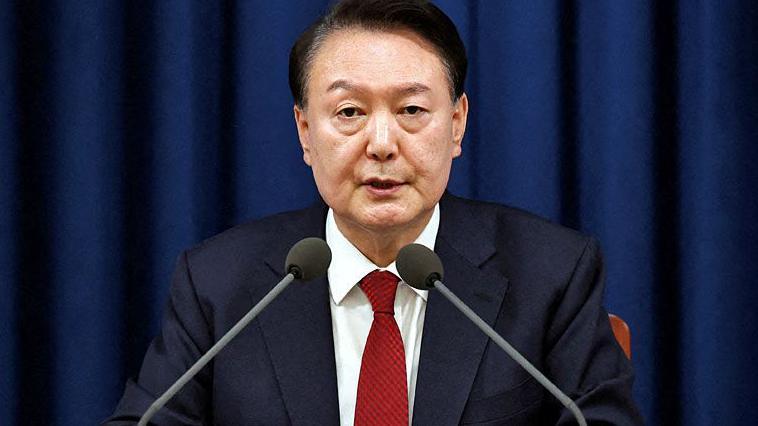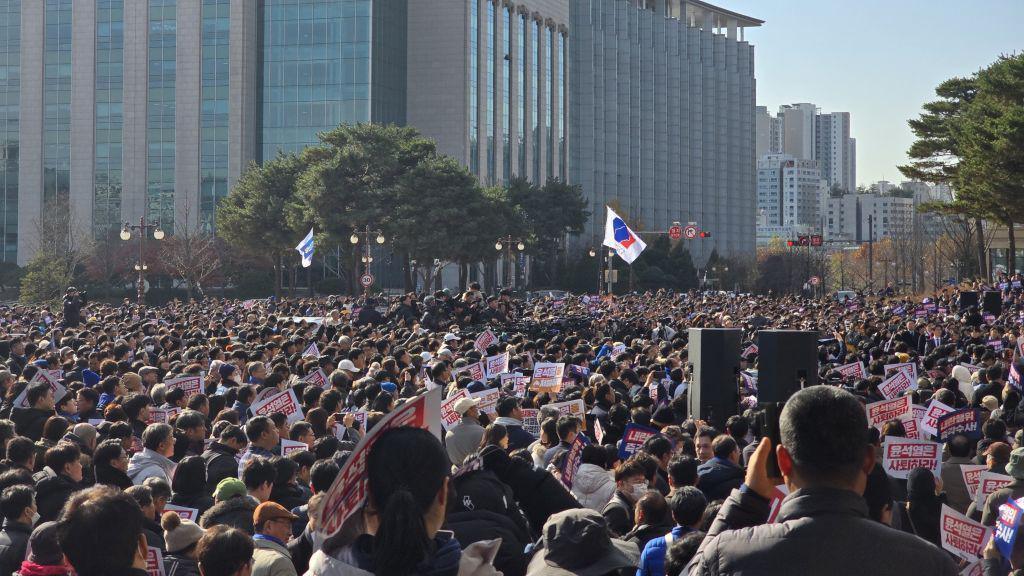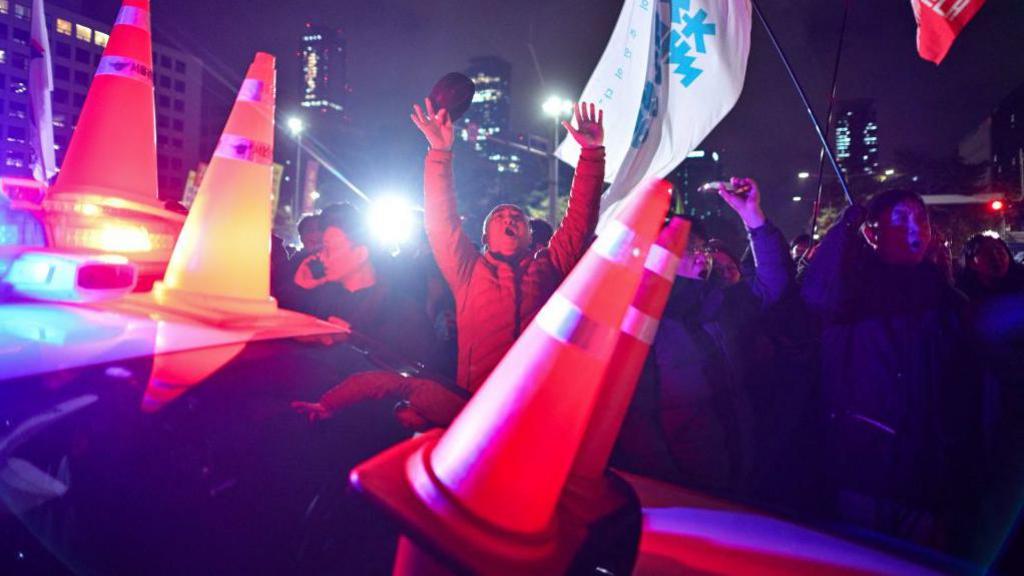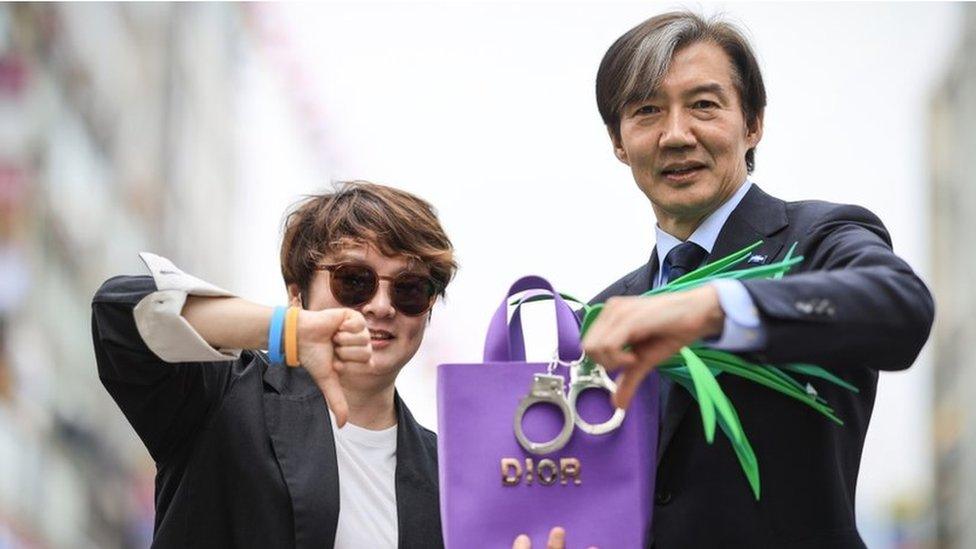The South Korean president's martial law gamble backfired: What was he thinking?

President Yoon's address felt like a throw back in time - to military rule decades ago
- Published
One of the biggest questions on people's minds in Seoul on Wednesday is: what was the president thinking?
In a late-night address that threw South Korea’s parliament into chaos and tested the country’s commitment to democracy, President Yoon Suk Yeol declared that he was imposing martial law.
Less than 24 hours later, his political future is on the brink, with protests on the streets and impeachment proceedings against him under way.
So, what happened?
Martial law was last introduced in South Korea in 1979, sparked by the assassination of the then-military ruler in a coup. Today's South Korea, however, is a far cry from that, and the repressive years that followed.
It is a stable, prosperous democracy - yet Yoon claimed he was introducing military rule to save the country from dark forces. He called the opposition-controlled National Assembly a “den of criminals” that was “attempting to paralyse” the government.
Hours later, he was forced to back down as furious protesters and lawmakers gathered outside the National Assembly - the MPs made it inside and voted down the order.
Watch: How two hours of martial law unfolded
His shock declaration was, in fact, a bid to get the kind of grip on power that has eluded him since he won the presidency in 2022 by the slimmest margin in South Korea's history.
And barely a month has passed since then without controversy.
In late 2022, he was criticised for his government’s response to the horrific crowd crush during Halloween, which killed 159 young people in Seoul.
Then there were calls to investigate his wife after she was caught accepting a Dior handbag as a gift - a scandal that is always hovering close to the headlines.
In April this year, his party was defeated in parliamentary elections, leaving him in a lame-duck position. This week alone he has been locked in a political battle with opposition lawmakers over the country's budget.
Even before he told South Koreans he was suspending their rights, his approval rate was below 20%.
There are some clues in Yoon's address as to what he was thinking.
What was immediately evident was that he was frustrated with the opposition-controlled parliament. In his Tuesday night address, he called the assembly where they exercise their mandate a “monster that destroys the liberal democratic system”.
The reference to a threat from North Korea and "anti-state forces" suggests he was also hoping to garner support from the kind of right-wing conservatives in South Korea who label liberal politicians "communists".
But the president misread his country and its politics.

Yoon's shock announcement has drawn huge crowds in protest
His declaration was a chilling reminder of a period many in South Korea have tried to forget. On television, newsreaders were seen shaking.
In 1980, when pro-democracy activists, many of them students, took to the streets of the city of Gwangju to protest at martial law, the army responded with violence and around 200 people were killed.
While martial law lasted three years - 1979 to 1981 - there had been military rule for decades before, and it continued until 1987. And in those years South Korea was rife with suspicion, when anti-government activists were dubbed Communist spies and arrested or killed.
Yet, during his election campaign Yoon praised authoritarian general Chun Doo-hwan and said he had managed government affairs well – except for his suppression of pro-democracy activists.
He was later forced to apologise and said he “certainly did not defend or praise Chun's government”.
But it does provide some insight into the president’s view of what constitutes power.
There have been rumours in South Korean political circles for months that Yoon was considering imposing martial law. In September, opposition leaders and party members declared it was a possibility. Most dismissed it as too extreme an option.
But he may well have been driven by something more: the fear of prosecution.
Park Geun-hye, the country’s first female leader, was jailed after being found guilty of abuse of power and corruption. Her predecessor, Lee Myung-bak, was investigated over allegations he was involved in stock price manipulation. He was sentenced to 17 years in prison for corruption and bribery in 2020.
Another former president, Roh Moo-hyun, took his own life in 2009 while under investigation for allegedly receiving millions in bribes.
In South Korea, prosecutions have almost become a political tool – a threat for the opposition to wield. It may partly explain why President Yoon took such drastic action.
Whatever his motives, Yoon's career will struggle to recover from this. He is also facing calls to resign, and some local media reported that members of his own People Power Party were discussing expelling him from the party.
South Korea is a stable democracy – but it is a noisy one. And it refused to accept another authoritarian diktat.
President Yoon will now face the judgement of a parliament and a people after they rejected the most serious challenge to the country’s democracy since the 1980s.
Related topics
- Published4 December 2024

- Published11 April 2024
